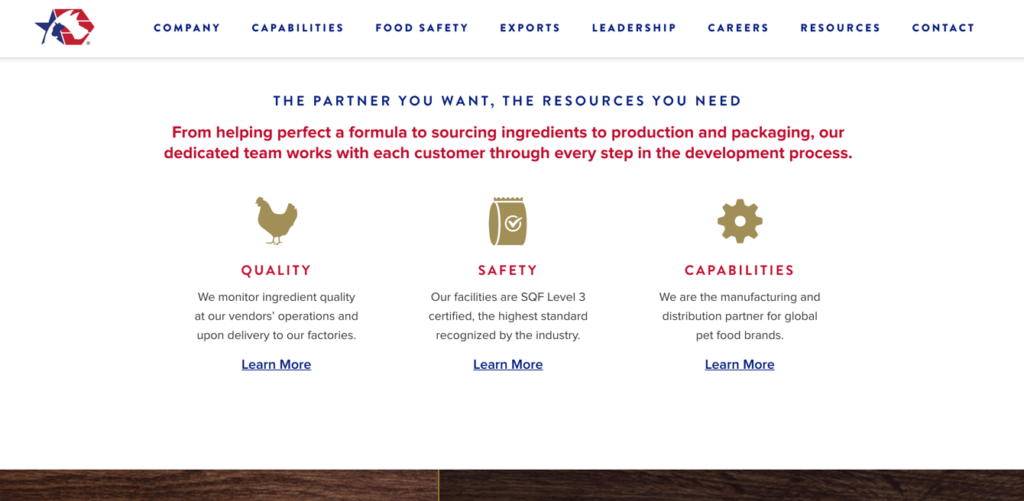“Manufacturing” means many things to many people. It’s a broad classification covering everything from the life sciences, pharma and food processing to technology, energy, chemicals, textiles and more. That’s just part of what makes marketing such a difficult proposition for manufacturers.
We’re here to help.
This guide is designed to assist manufacturers in identifying effective marketing strategies to grow their businesses. There are a plethora of options out there for marketers and executives, but these six tips have proven effective for us in 15 years of working with manufacturers of all stripes.
Read on if you’re a manufacturer who wants to:
- Establish your brand in a competitive industry
- Generate sales-ready leads in the U.S. or internationally
- Make your marketing more strategic and efficient

6 Essential Marketing Tips for Manufacturers
- Dive deep into your business
- Build effective buyer personas
- Align marketing with your sales channels
- Pay attention to your website
- Produce content with a purpose
- Deploy intelligent advertising
Manufacturing Marketing Tip #1: Honestly Assess Your Company
When we ask a manufacturing client what makes their business special, we pretty much always hear the same few things.
- They have tons of experience.
- They’re technical experts.
- They offer top-notch customer service.
- They’re willing to be flexible and meet the needs of the buyer.
Those are all great attributes. Problem is, everybody says the same stuff.
There’s no point in investing in growth unless there’s a good reason why you should grow. What makes you different from the competition?
Not “different.” Really different.
Differentiation Case Study
Take Vizinex, a Pennsylvania-based manufacturer of RFID tags.
The world is certainly not lacking for RFID tag manufacturers. Google turns up about 6 million results for the term. They come at all price points, in the U.S. and abroad, with all kinds of specialties.
In such a competitive market, it wasn’t good enough for Vizinex to simply say they were “better.”
Instead, they looked deep for a true differentiator. And they found a few.
First and foremost, their engineers excel in rapidly creating truly custom RFID tag solutions, including some that can be embedded directly within an OEM’s product. And the durability of their tags makes them uniquely suited for challenging applications, like undergoing autoclave sterilization, being attached to large cables and being left out in the weather in laydown yards.
They did a great job articulating these true differences on their website, and business growth soon followed.

Manufacturing Marketing Tip #2: Build Effective Buyer Personas
Setting yourself apart is only half the battle. You also need to understand who your potential customers are and what they want.
In B2B marketing, we call these “buyer personas.”
They’re representative sketches of stakeholders in the marketing and sales process. They help you map out who you need to speak to specific points, what you need to say to them and how you need to proceed.
Most critically, buyer personas contain “biographical” information on each group. This allows writers, strategists and other marketers to picture exactly who they’re messaging to at any given point. The result is a better honed and more effective message.
Why Buyer Personas Matter
Imagine two conversations.
The first is face to face with an acquaintance. You might not know everything about her, but you know where she works, what she does and roughly how old she is. Chances are, this conversation is going to be pretty decent – you at least know what you’re working with.
The second conversation is over the phone with a complete stranger. You know nothing about this person, and you can’t gauge their reactions.
Spoiler alert: The second conversation ends badly.
This is why buyer personas are so important to marketing a manufacturing company. If you know – or “know” – the target of your messaging, it’s more likely to go over well. If you’re taking a shot in the dark, you’re counting on pure luck.
How To Build Buyer Personas
Buyer personas are very much A Thing in B2B marketing.
Everyone has their favorite template, their favorite format and their favorite things to include. There’s even a Buyer Persona Institute.
Fact is, building buyer personas doesn’t need to be difficult.
You probably don’t even need to conduct full-scale market research. In fact, your best resources are your own salespeople and systems.
To build your buyer personas, you should:
- Crack open your CRM or client list
- Look at who first made contact with you from each, who the decision maker is, and who the primary point of contact is
- Talk candidly and openly with your sales team about what each is like
Oversimplified? A tiny bit. But all you’re really doing when you’re writing buyer personas is trying to summarize what each group of people is like, and what they like.
What questions do the folks in procurement always ask? What are clients’ engineers usually like? When does the CEO start to smile in conversations? Those are the kinds of things you want in your personas.
Manufacturing Marketing Tip #3: Align Marketing with Sales
For most B2B companies, aligning marketing and sales simply means smoothing the handoff between a prospect coming into the funnel as a lead and sales working them.
It’s much more complex for manufacturing companies.
If you’re a custom manufacturer, your sales cycle is going to be far different than if you’re selling a standard set of SKUs. You need to treat a distributor/dealer channel far differently than a captive internal sales team. And if you’re a contract manufacturer, you’re looking to talk to large enterprises, rather than SMBs or end users.
In other words, you need to be absolutely sure that the way you choose to market your manufacturing firm fits with what you’re really trying to do.
If you’re dependent on a channel, your main goal should be building your brand’s reputation while recruiting more distributors and dealers.
If you sell standard products to end users, you’re looking for highly qualified, highly motivated buyers.
If you need to attract enterprises, you might be well-served to try targeted account-based marketing.
This should all be reflected on your website, in your content strategy and in your holistic marketing plan. Above all, remember to focus on your true objective: Giving sales not just leads, but the right kind of leads.
Manufacturing Marketing Tip #4: Pay Attention to Your Website
Too many manufacturers have told us that their website doesn’t matter.
“We’re a relationship business! Nobody in this industry is using Google!”
It’s 2019. That’s wrong.
About 90% of B2B buyers use the internet while researching a purchase or partnership. No matter how belly-to-belly your sales cycle, there’s basically no chance that your prospective customers aren’t paying at least some attention to your website.
You should, too.
What Makes a Good Website?
The No. 1 priority in a marketing website for a manufacturer is its ability to convey information clearly. It needs to connect quickly and obviously with the target and instantly make the case as to why you’re the right choice.
Marketing for manufacturers isn’t like selling widgets. It’s very rarely a one-off sale. Instead, you’re focusing on building a partnership – and hopefully along-lasting one. That means trust and credibility are incredibly important.
Take American Nutrition.
ANI is the leading producer of private label and white label pet foods and treats. They’re after a very specific clientele: Brands that want to create and market a premium or ultra-premium pet food product.
They’ve matched that perfectly on their website. The homepage and Capabilities page speak directly to what they can do for their partners, and their thought leadership section clearly shows their authority in the space.

Of course, what works for American Nutrition isn’t going to work for every manufacturer. But if you can connect with your target customer as well as they do, you’ll be in great shape.
Manufacturing Marketing Tip #5: Produce Content with a Purpose
As 2020 nears, it feels like we’ve reached Peak Content Marketing.
Everyone wants to produce content. Tons of content. For … reasons.
The truth is, content marketing without a purpose is pretty pointless.
Don’t even consider bringing a content marketing resource (or agency) on board unless you know what you’re looking to accomplish.
Are your manufacturing competitors destroying you in organic search results? That’s a good reason to think about juicing your SEO with good content.
Do you produce a technical product and need to show your credibility with engineers and other highly educated buyers? Great reason to try content marketing.
Are your prospects the type to download white papers and product sheets in the buying cycle? Producing premium assets like these and “gating” them behind forms is a classic lead generation strategy.
Conversely, if you can’t think of a good reason why you should be producing content, there probably isn’t much reason to do it. Thinking strategically is the key to marketing a manufacturing company.
Types of B2B Content
Once you’ve determined why you’re producing content, you need to create it. Again, you can hire in-house or outsource to a strategic agency partner. From there, it’s all about creating a mix of:
- Blog posts
- How-to content
- Technical articles
- White papers
- Guides
- FAQs
- Videos, both live-action and animated
- Audio content, like podcasts and interviews
- Case studies
Look back at your buyer personas. What are they going to want? That’s what you should create.
Manufacturing Marketing Tip #6: Deploy Intelligent Advertising
Finally, almost every marketing campaign for a manufacturer involves some level of paid advertising spend.
The key isn’t how much you spend on advertising. Rather, it’s how you spend it.
Think about advertising in two big buckets.
First is demographic advertising. Here, you’re reaching out to people based on who they are; job title, location, etc.
Second is behavioral advertising. Here, you’re reaching out to people based on what they do, like a Google search.
The best marketing campaigns combine the two.
Demographic campaigns, like LinkedIn ads and targeted placements on industry news websites, allow you to reach buyers before they know they’re in the market. They also provide air cover in case someone is actively looking and just missed you.
(Pro Tip #1: You don’t always need to buy ads directly from a website to appear there. Google Display Network lets you bid on specific domains, giving you a good chance of getting the same digital real estate at a bargain price.)
Behavioral campaigns, typically Google search ads, are designed to strike while the iron is hot. You want someone to search for exactly what you do, then give them a landing page that speaks specifically to the intent of their search. Ideally, they’ll convert quickly and become an instant lead.
(Pro Tip #2: Bing isn’t worth much in search advertising, but it’s a great tool for reaching engineers and IT professionals. They tend to love it.)
Don’t just throw mud against the wall with your B2B advertising. Use your buyer personas to uncover demographic information and go where your prospects already are. Then back that up with search ads to catch them in the act of research, and you’ll have a marketing campaign that gets results quickly and consistently.
Conclusion
In this post, we’ve discussed:
- The importance of understanding your real differentiators before starting a marketing campaign
- Getting to know your buyers
- Focusing your marketing on getting the right types of leads for your sales team
- Why your website needs to clearly show your value in a way that appeals to your specific client niche
- Creating content with a purpose, not just to create it
- How a diverse advertising mix helps you reach your targets efficiently
If you keep these six tips in mind, you’re like to have success marketing your manufacturing company. If you don’t, growth is going to be much more difficult.
Of course, if you don’t have the internal marketing resources you need, we can help. Altitude is a full-service B2B marketing firm with particular expertise in helping manufacturers reach their goals. We’ve worked with companies like Vizinex and ANI for 15 years, so we know a thing or two about generating the right types of leads and building brands that dominate their industries.
Sound like something you might want? Contact us or give us a call at 610-421-8601 x122. We’d love to take half an hour and talk through your goals and options.



